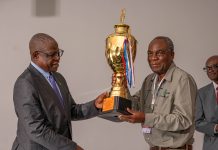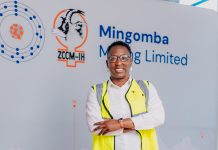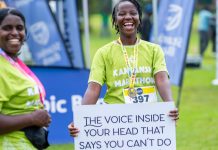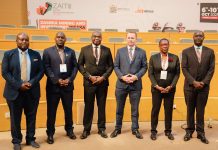Almost two years after becoming the first woman in Zambia to head up an exploration company at Kobold Metals’ Africa division, Ms Mfikeyi Makayi tells Mining For Zambia how she got where she is today, and what it’s like to be a leader in a cutting-edge business that hopes to build the biggest copper mine in Zambian history.
After graduating from Old Dominion University (ODU) with a bachelor’s degree in civil engineering, you worked for a year in the United States in geotechnical engineering, an important branch in mining, which you’ve said was pivotal in your career.
Was it this kind of work that drew you to mining, or was it only when you returned to ODU for your master’s in environmental engineering that you decided mining was the field for you?
I really like this question because the answer is neither! I wasn’t drawn to mining at that time. When I was doing my bachelor’s I didn’t know all that much about the mining sector. I was born and raised in Lusaka, which isn’t a ‘mining town’.
Geotechnical engineering is a broad field, and I studied it from a civil engineering perspective. I loved my soil mechanics and foundation design classes – looking at things like how to build skyscrapers or tunnels, pile driving techniques. If you think about the New York subway or the London Underground, geotechnical engineering is key. The same principles apply in mining.
I graduated with my civil engineering degree in 2007 and worked at a small geotechnical company on the East Coast of Virginia, running the geotech soil prep lab and doing foundation designs for residential properties. Then, in 2008, the global recession hit, and I was retrenched.
That’s very unfortunate. What came next?
To buy time, I decided to pursue a master’s in environmental engineering. I had a great relationship with my university, and my professors assisted me in getting a stipend. But when I graduated in 2009, the global economy hadn’t improved. My mother basically said, “I’m still paying your rent and you have a master’s degree, so you need to come back home!”
When I came back to Zambia in 2010, Lusaka didn’t have many opportunities. I was put in touch with First Quantum Minerals’ HR department, who told me there was an opening in Solwezi at the Kansanshi mine. Back then, Solwezi was quite different and I had no idea what to expect! But the next thing I knew, I was in Solwezi working on a mine.
What were your first impressions of the mining world?
The scale of Kansanshi’s operation was fascinating. Between 2010 and 2014, the mine was expanding – installing new gyratory crushers, building retaining walls, houses, and all sorts of things. I wouldn’t have seen that if I’d taken a civil engineering job in Lusaka.
On the mine, you get the full suite of everything. If the process plant shuts down for maintenance, you’re working with a shovel alongside bricklayers, digging trenches for process water pipes – day or night shift, in the rain. It becomes part of your wider responsibility. It was eye-opening.
Looking back, I got a ‘big picture’ understanding of mining because I wasn’t siloed into one role. If I’d got a standard engineering job in the city, I might have specialized too early – but at Kansanshi, I saw everything end to end.
“Looking back, I got a ‘big picture’ understanding of mining because I wasn’t siloed into one role. If I’d got a standard engineering job in the city, I might have specialized too early – but at Kansanshi, I saw everything end to end.”
Do you think you would have viewed the opportunity at KoBold with as much interest if you didn’t have a keen interest in geotechnical engineering?
That’s an interesting question. Geotechnical engineering is unusual in that you can specialise in it under civil engineering, mining engineering, or even engineering geology. But when I was at First Quantum Minerals (FQM), I spent a lot of time in the exploration division.
Mr James Mwale – a well-regarded Zambian exploration geologist, and Kansanshi’s exploration manager at the time – was my mentor. I was trying to find my feet in this huge mining operation, and every time I went for mentorship and coaching sessions he’d be looking at rocks, working with acid, and scratching stuff. That was my exposure to exploration. In retrospect, it gave me an appreciation of exploration, and influenced what KoBold’s work would mean for my career.
How did it feel to become the first Zambian woman running an exploration company in the country?
I get this question a lot, but I don’t walk around thinking, ‘Hey, I’m the first Zambian woman to do this!’ [She laughs.] I just wake up and get the job done.
I didn’t actually realise it was a milestone until it came out in the media. I respect and acknowledge what this means to other people, but the way I see it: I got an opportunity and I took it. It was more about understanding the scale of the task – which sometimes feels like national duty – and still remaining grounded.
Was I terrified? Absolutely. I had seven rounds of interviews. I had to write about ethics and the role of a CEO, for instance. It was intimidating, but you have to go in and be authentic. If you don’t know something, don’t make it up. The process taught me that knowing your own value is key.
You’ve spoken about your time at Banani International Secondary School in Central Province, saying: “There was no limitation on what one could dream to become at Banani.” To what extent were your ambitions fostered by this school?
Looking back, one of the classes that the school was very deliberate about was a ‘character development’ class, from 8th to 12th grade. When someone teaches you to focus on kindness, trust, honesty, and values at such a young age – which is also a function of your upbringing and spiritual beliefs – you later see it manifest in your work ethic and character. My moral compass is quite alert, and I think my desire to have a positive impact on society was partly shaped during my time at Banani.
What are some of the cornerstones of a strong education that you’d like to see schools focus on?
Character building is one – and not because it’s just in the curriculum; it must be part of a school’s values. I also wish I’d learned financial acumen very, very early – like at high school or secondary school level. I also think that more focus on the liberal arts and philosophy in whatever form would be beneficial. It was only when I got to college in the US that I started learning about Chinese philosophy and European philosophy, and you start to understand how those philosophical beliefs shape societies. I also think there’s a need to add African philosophical beliefs to the curriculum.
There’s a sort of disconnect: we treat philosophy as culture or arts, yet it’s philosophy that helps us operate and function as a society. Why aren’t we able to connect those systems of respect, honor, trust that come through our traditional hierarchy, and translate it to how we work in the modern world? I would have loved to learn that at a young age, because then you have a sense of self and identity.
A couple of years ago, I authored a chapter of a book called Ethical Management in Africa Governance Systems – related to seeing how we can use our traditional beliefs in governance and management. I had to do interviews and send questionnaires specifically to my parents’ generation [about things like] how women or men are taught to manage their homes, and how to negotiate conflict – which are principles that can be used in business, of course.
In Zambia, you call an elder to go and help negotiate. The application is: how do we translate that into good governance and accountability? We’ve found it hard as Africans to hold leaders accountable because our culture says that you can’t tell an older person they’re wrong – which isn’t always correct.
What lessons do you bring to KoBold from your time at FQM and Barloworld?
The groundwork in the early years matters – that was like my apprenticeship. If you’ve never picked up a shovel, you can’t fully understand the running of an operation. Doing the work alongside miners earns respect and helps you understand your limits and your grit.
I also learned that becoming a leader is a mindset. It’s a continuous and highly iterative process. You don’t ‘arrive’. If you conduct yourself like a CEO, you gradually start becoming that person. It’s not an automatic badge that appears with the appointment.
Another key learning is around taking care of yourself. I’ve burned out before and it’s not nice. This is a shift-based industry that works 24/7, so if you want a strong, productive workforce you have to take care of people’s wellbeing.
“I also learned that becoming a leader is a mindset. It’s a continuous and highly iterative process. You don’t ‘arrive’. If you conduct yourself like a CEO, you gradually start becoming that person. It’s not an automatic badge that appears with the appointment.”
What’s been the biggest challenge in this job, and what does a typical day as KoBold Metals Africa’s CEO look like?
The biggest challenge is balancing day-to-day operations with the company’s strategic vision. Although KoBold’s been in the US for seven years, in Zambia we’re fundamentally a startup – only three years in. We don’t have ten people doing ten different things, so I wear multiple hats: one minute I’m dealing with operations, the next it’s finance, then business development. Some days, international media houses call for an interview, you have to be ready to deliver a speech, next you’re working on manpower planning with HR, or you’re reading a scientific paper or learning python.
It’s proper startup territory, and I love it. I love rolling up my sleeves and doing the work, but I have to know when to let other people run the show as well.
***
Look out for Part 2 of this exclusive interview, in which Mfikeyi Makayi tells us what it’s like to work for KoBold Metals, and what exciting plans the company has on the horizon.
See also: Breaking new ground

























I want to of part of that team
What an incredibly inspiring journey, Mfikeyi. Your story reflects a rare blend of technical brilliance, grounded leadership, and cultural intelligence. The way you’ve navigated from civil and environmental engineering into mining leadership while staying true to your values and vision is a blueprint for purposeful leadership on the continent. Your reflections on character development, traditional governance, and authentic leadership are deeply impactful. Thank you for carrying the torch not just for women in mining, but for every young African dreaming beyond boundaries.
Wishing you continued success as you lead KoBold Metals Africa into its next chapter.
#Respect #LeadershipWithPurpose #WomenInMining #KoBoldMetals #ZambiaToTheWorld